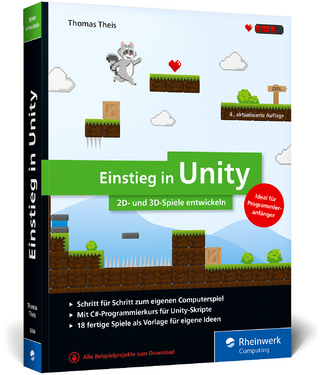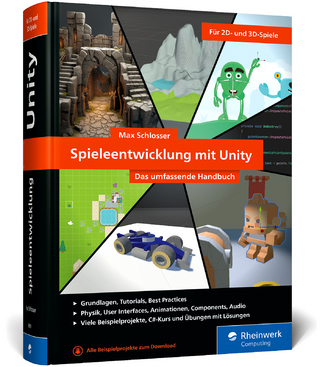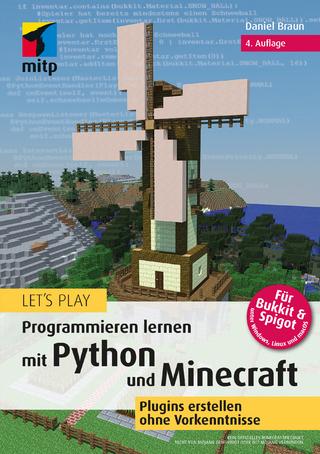
Unity 5: Learning C# by Developing Games
Packt Publishing Limited (Verlag)
978-1-78712-727-2 (ISBN)
- Titel ist leider vergriffen;
keine Neuauflage - Artikel merken
About This Book
• Demystify the C# programming language in Unity 5.x.
• Unleash the power of Unity to create a wide variety of projects in numerous genres and formats.
• Master the art of optimization for Unity 5.x applications with tips and techniques that will further enhance your game.
Who This Book Is For
Beginner level Unity developers who do not have much programming experience.
What You Will Learn
• Master the art of applying C# in Unity. Get to know about techniques to turn your game idea into working project.
• Use loops and collections efficiently in Unity to reduce the amount of code.
• Create and code a good-looking functional UI system for your game.
• Find out how to create exciting and interactive games using GUIs.
• Work with different animation assets and components to enhance your game further.
• Personalize your game by learning how to use Unity's advanced animation system.
• Create, visualize, and edit animated creatures to add to your already amazing game.
• Familiarize yourself with the tools and practices of game development Discover how to create the Game Manager class to, generate game levels, and develop UI for the game.
• Use the Unity Profiler to find bottlenecks anywhere in your application, and discover how to resolve them.
• Implement best practices for C# scripting to avoid common mistakes
In Detail
Unity is a cross-platform game engine that is used to develop 2D and 3D video games. Unity 5 is the latest version, and adds a real-time global illumination to the games; and its powerful new features help to improve a game's efficiency.
If you love games and want to learn how to make them but have no idea where to begin, then this course is built just for you. This learning path is divided into three modules which will take you in this incredible journey of creating games.
The course begins with getting you started with programming behaviors in C# so that you can create 2D games in Unity. You will begin by installing Unity and learning about its features. You will learn how to perform object-oriented programming and discover how to manage the game play loop, generate game levels, and develop a simple UI for the game. By the time this module comes to a close, you will have mastered the art of applying C# in Unity.
It is now time we put into use what we learned in the previous module into reality as we move onto the second module. Here, we will be building 7-8 action-packed games of different difficulty levels. Each project will focus on key Unity features as well as game strategy development. This module will mark your transformation from an application developer to a full-fledged Unity game developer.
Who wouldn't love a game that is fully perfect, functional, and without any glitches? The third module deals with just that by teaching how to enhance your game by learning game optimization skills. Here, you'll gain an understanding of possible solutions to any problem and how to implement them. You will then learn everything you need to know about where performance bottlenecks can be found, why they happen, and how to work around them.
With this massive wealth of knowledge, at the end of this learning path, you will be able to leverage an array of game development techniques to create your own basic games while resolving any issues that you encounter.
Style and approach
This learning path should be treated as the complete package necessary for building games. It is a step-by-step guide to develop a game from scratch by applying the fundamentals of C# and Unity scripting, with a reference guide in the end to solve all your gaming problems.
Greg Lukosek was born and raised in the Upper Silesia region of Poland. When he was about 8 years old, his amazing parents bought him and his brother a Commodore C64. That was when his love of programming started. He would spend hours writing simple basic code, and when he couldn't write it on the computer directly, he used a notepad. Greg completed his mechanical engineering diploma at ZSTiO Meritum— Siemianowice Slaskie, Poland. He has learned all his programming skills through determination and hard work at home. Greg met the love of his life, Kasia, in 2003, which changed his life forever. They both moved to London in search of adventure and decided to stay there. He started work as a 3D artist and drifted away from programming for some years. Deep inside, he still felt the urge to come back to game programming. During his career as a 3D artist, he discovered Unity and adopted it for an interactive visualizations project. At that very moment, he started programming again. His love for programming overcomes his love for 3D graphics. Greg ditched his 3D artist career and came back to writing code professionally. He is now doing what he really wanted to do since he was 8 years old—developing games. These days, Greg lives in a little town called Sandy in the UK with Kasia and their son, Adam. John P. Doran is a technical game designer who has been creating games for over 10 years. He has worked on an assortment of games in teams consisting of just himself to over 70 people in student, mod, and professional projects in different roles, from game designer to lead UI programmer. He previously worked at LucasArts on Star Wars: 1313 as a game designer. He later graduated from DigiPen Institute of Technology in Redmond, WA, with a Bachelor of Science in game design. John is currently a part of DigiPen's Research and Development branch in Singapore in addition to DigiPen Game Studios. He is also the lead instructor of the DigiPen-Ubisoft Campus Game Programming Program, instructing graduate-level students in an intensive, advanced-level game programming curriculum. In addition to that, he also tutors and assists students in various subjects and gives lectures on C#, C++, Unreal, Unity, game design, and more. He is the author of Unreal Engine Game Development Cookbook, Building an FPS Game in Unity, Unity Game Development Blueprints, Getting Started with UDK, UDK Game Development, Mastering UDK Game Development, and he cowrote UDK iOS Game Development Beginner's Guide, all available from Packt Publishing. More information about him can be found at http://johnpdoran.com. Chris Dickinson grew up in England with a strong passion for science, mathematics, and video games. He received his master's degree in physics with electronics from the University of Leeds in 2005, and immediately traveled to California to work on scientific research in the heart of Silicon Valley. Finding that career path unsuitable, he began working in the software industry. Over the last decade, he has made a career in software development, becoming a senior software developer. Chris has primarily worked in software automation and internal test tool development, but his passion for video games never fully faded. In 2010, he took the path of discovering the secrets of game development and 3D graphics by completing a second degree—a bachelor's degree in game and simulation programming. He authored a tutorial book on game physics (Learning Game Physics with Bullet Physics and OpenGL by Packt Publishing). He continues to work in software development, creating independent game projects in his spare time with tools such as Unity 3D.
| Erscheinungsdatum | 29.11.2017 |
|---|---|
| Verlagsort | Birmingham |
| Sprache | englisch |
| Maße | 191 x 235 mm |
| Themenwelt | Informatik ► Software Entwicklung ► Spieleprogrammierung |
| ISBN-10 | 1-78712-727-3 / 1787127273 |
| ISBN-13 | 978-1-78712-727-2 / 9781787127272 |
| Zustand | Neuware |
| Informationen gemäß Produktsicherheitsverordnung (GPSR) | |
| Haben Sie eine Frage zum Produkt? |
aus dem Bereich


